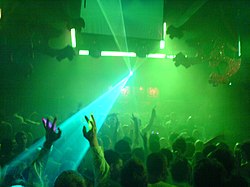

A superclub is a very large or superior nightclub, often with several rooms with different themes.[1][2] The term was first coined in Mixmag, the British electronic dance and clubbing magazine, in 1995, referring to the new wave of clubs such as Ministry of Sound and Cream, which were dominating the English club scene.[3]
Superclubs may include nightclubs that have high capacity, or are multi-story, high profile, and operate city and region wide or are well known.[4] Some superclubs are owned and managed by a dance music record label or a club that was or is culturally important. The term may also be used to define its position within the club scene hierarchy.[5][6][7]
Forerunners of contemporary superclubs already existed in the early 20th century. The Guardian describes the Moka Efti in Berlin, a major dancing establishment of the Golden Twenties, as a "1920s superclub".[8]
Privilege Ibiza is the "world's largest nightclub" according to the Guinness Book of Records, with a capacity of 10,000 people.
- ^ Haslam, Dave (13 August 2015). Life After Dark: A History of British Nightclubs & Music Venues. Simon and Schuster. p. Chapter 13. ISBN 9780857207005.
- ^ "Superclub definition and meaning | Collins English Dictionary". collinsdictionary.com. Collins, 2016. Retrieved 15 March 2017.
- ^ Robinson, Roxy (29 April 2016). Music Festivals and the Politics of Participation. Routledge. p. 37. ISBN 9781317091998.
- ^ Cohen, edited by Philip; Rustin, Michael J. (2008). London's turning : Thames Gateway-prospects and legacy. Aldershot, Hampshire, England: Ashgate. p. 2002. ISBN 9780754670636.
{{cite book}}:|first1=has generic name (help) - ^ O'Reilly, Daragh; Kerrigan, Finola (27 April 2010). Marketing the Arts: A Fresh Approach. Routledge. p. Chapter 7. ISBN 9781136995019.
- ^ Vine, Richard (14 June 2011). "Bianca Jagger celebrates her birthday at Studio 54". The Guardian. Retrieved 15 March 2017.
- ^ Lau, Stella Sai-Chun (2012). Popular Music in Evangelical Youth Culture. Cambridge, England: Routledge. p. 174. ISBN 978-0-415-88821-9.
- ^ Oltermann, Philip (24 November 2017). "Sex, seafood and 25,000 coffees a day: the wild 1920s superclub that inspired Babylon Berlin". The Guardian. Retrieved 11 January 2021.
© MMXXIII Rich X Search. We shall prevail. All rights reserved. Rich X Search
